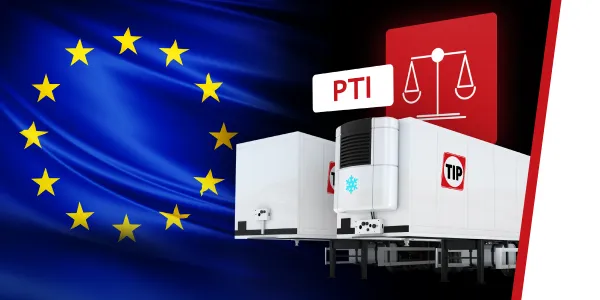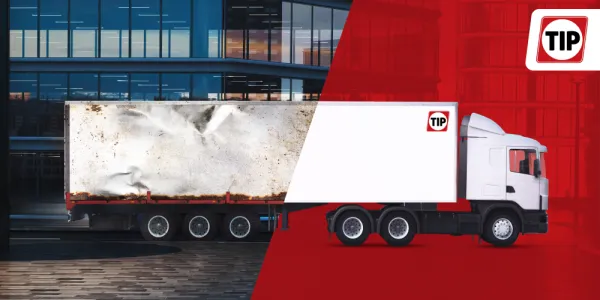Sustainable products and services to decarbonise road transport
What sustainable products and services are helping our customers improve efficiency and achieve their sustainability goals? In this article we discuss the innovations that help our customers reduce their carbon footprint, such as e-reefers, e-trucks, eLCV’s and TIP Insight. Supported by customer stories, we explain how each product and service has a significant impact on the carbon footprint of road transport.
Products that can help reduce your carbon footprint
Helping our customers reduce their carbon footprint is one of the key strategies for maximising our impact. We are therefore introducing new products and services that will not only help to decarbonise road transport, improve air quality, and ensure customers’ compliance with local regulations, but will also bring additional revenues. We are working to become the preferred sustainability partner for our customers and suppliers. Our electric vehicles (e-reefers, e-trucks, and eLCV’s) and our services bundled in TIP Insight are key to achieving this ambition.
Electric vehicles: from international haulage to last-mile deliveries
TIP Group currently operates approximately 16,000 refrigerated trailers. Refrigerated trailers – often called reefers - are vital in transporting perishable goods, such as medication, food, flowers. But they generally are diesel-powered. Replacing these engines with electric motors powered by batteries is a crucial part of our sustainability strategy ‘for Generations to Come’. Through the adoption of e-reefers, depending upon the configuration, we can reduce carbon emissions by 58-100% during operation , decreasing trailer carbon emissions by more than 67%. The actual reduction is, of course, dependent on the energy source. We are working with several partners to test a variety of systems to power its e-reefers, including:
- Battery only solution: powered by renewable sources
- Energy recuperation axle solution: kinetic-powered, emission-free reefers make full use of the energy braking generates
- Solar powered solution: photovoltaic panels installed on trailer roofs are able to power the cooling units exclusively, making it zero-emission
“Our partnership with TIP Group is central to DLG’s commitment to the European Green Deal. Our trial run with e-reefers supplied by TIP showed us that our network can save 60-70% CO2 per trip cycle. On top of this, a key benefit is that we can reduce the carbon footprint for our served supply chains without needing to change our transportation network significantly.” – Joost Visbeen, Group CEO at DLG.
Many of our customers express a strong interest in incorporating electric trucks into their fleets but face significant challenges. With a diverse range of vehicles and services, TIP simplifies the implementation of e-trucks in its customers’ fleets. Our lease and rental services not only address concerns such as total cost of ownership, cost transparency and CO2 emissions reduction targets, but also enable companies to gain hands-on experience with electric vehicles without assuming any investment risks.
To overcome the obstacle of infrastructural challenges, TIP facilities collaborations with major energy companies that can act as partners to our customers and enhance route-specific infrastructure. Through this offering, we have seen significantly increased interest in the deployment of e-trucks in many regions.
Electric Light Vehicles (eLCV) are mainly used for last-mile delivery in cities. We currently have circa 200 eLCVs in operation, many of which have already been allocated to customers for their urban freight in Low Emission Zones. To support the growing demand of our customers, we’re extending our fleet with 34 additional eLCVs.

TIP Insight: digital solutions for increased efficiency
“TIP Insight and BrakePlus are crucial to our fleet’s operation, supporting our strategic objectives of mitigating risk and ensuring our colleagues and other road users remain safe. […] All in all, BrakePlus and TIP Insight provided a return on investment within 12 months." – Adam Purshall, Fleet & Procurement Director Menzies Distribution.
TIP Insight contains four tools that use telematics data to help transport companies reduce their carbon emissions. The available TIP Insight products include:
- FleetConnected: Track & trace solution that provides real-time telematics data that allows transport companies to optimise routes and schedules.
- BrakePlus: Monitors brake performance and condition, improves efficiency of maintenance planning and parts replacement
- DoorPlus: monitors rear doors, helps drivers keep a constant temperature, prevents wastage and increases security
At the end of 2023, more than 26,000 units were connected to TIP Insight to help transport companies reduce their carbon emissions – a long way towards our 2025 target of 35,000. In addition to TIP Insight, over 4,850 industry professionals have signed up to FleetRadar, our digital fleet management platform, as per June 2024.
Refurbishment extends trailer lifespan and promotes resource efficiency
Refurbishment of trailers and parts is another cost-effective way and sustainable way to extend their lifespan and promote resource efficiency. Collaborations like our partnership with DSV are instrumental in achieving substantial reductions in carbon emissions. In the past two years, we have refurbished 2,445 trailers, putting us on course to meet our target of 5,300 by 2025. In addition to waste management and refurbishment, we prioritise efficient vehicle utilisation, ensuring our customer’ fleet operates optimally throughout their lifecycle.
Our customers are at the heart of TIP Group’s sustainability strategy for ‘Generations to Come’. It revolves around offering them competitive options for deploying more sustainable assets and providing services that allow for improved efficiency and thereby lowering carbon emissions. In the end, we can only be successful when we help our customers achieve their (sustainability) goals. And while we offer extensive information about our sustainable products and services on our website (click here), a conversation would probably provide significantly more insight. Please contact your local TIP representative to schedule an appointment.











